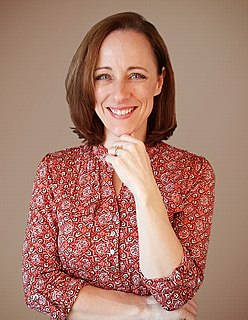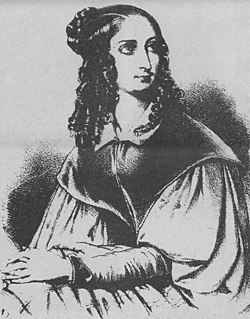A Quote by Honore de Balzac
A woman, even a prude, is not long at a loss, however dire her plight. She would seen always to have in hand the fig leaf our Mother Eve bequeathed to her.
Related Quotes
She remembered that once, when she was a little girl, she had seen a pretty young woman with golden hair down to her knees in a long flowered dress, and had said to her, without thinking, "Are you a princess?" The girl had laughed very kindly at her and asked her what her name was. Blanche remembered going away from her, led by her mother's hand, thinking to herself that the girl really was a princess, but in disguise. And she had resolved that someday, she would dress as though she were a princess in disguise.
You could be a gambler. A thief, for all I know. Besides—” He captured her hand and stopped her from walking on, holding her in place. “Besides what, you insufferable prude?” “Prude, eh? Do you need another kiss to remind you what a prude I am?” “Don’t you dare.” “Then don’t call me names.” “You started it.
But her name was Esmé. She was a girl with long, long, red, red hair. Her mother braided it. The flower shop boy stood behind her and held it in his hand. Her mother cut it off and hung it from a chandelier. She was Queen. Mazishta. Her hair was black and her handmaidens dressed it with pearls and silver pins. Her flesh was golden like the desert. Her flesh was pale like cream. Her eyes were blue. Brown.
I do not mourn the loss of my sister because she will always be with me, in my heart," she says. "I am, however, rather annoyed that my Tara has left me to suffer you lot alone. I do not see as well without her. I do not hear as well without her. I do not feel as well without her. I would be better off without a hand or a leg than without my sister. Then at least she would be here to mock my appearance and claim to be the pretty one for a change. We have all lost our Tara, but I have lost a part of myself as well.
Our mother always taught us to be in control of our voice and our bodies and our work, and she showed us that through her example. If she conjured up an idea, there was not one element of that idea that she was not going to have her hand in. She was not going to hand that over to someone. And I think it's been an interesting thing to navigate, especially watching you do the same in all aspects of your work: Society labels that a control freak, an obsessive woman, or someone who has an inability to trust her team or to empower other people to do the work, which is completely untrue.
She knew with suddeness and ease that this moment would be with her always, within hand's reach of memory. She doubted if they all sensed it - they had seen the world - but even George was silent for a minute as they looked, and the scene, the smell, even the sound of the band playing a faintly recognisable movie theme, was locked forever in her, and she was at peace.
I looked and looked at her, and I knew, as clearly as I know that I will die, that I loved her more than anything I had ever seen or imagined on earth. She was only the dead-leaf echo of the nymphet from long ago - but I loved her, this Lolita, pale and polluted and big with another man's child. She could fade and wither - I didn't care. I would still go mad with tenderness at the mere sight of her face.
Sometimes we adopt certain beliefs when we're children and use them automatically when we become adults, without ever checking them out against reality. This brings to mind the story of the woman who always cut off the end of the turkey when she put it in the oven. Her daughter asked her why, and her mother responded, "I don't know. My mother always did it." Then she went and asked her mother, who said, "I don't know. My mother always did it." The she went and asked her grandmother, who said, "The oven wasn't big enough."
Virtue and vice suppose the freedom to choose between good and evil; but what can be the morals of a woman who is not even in possession of herself, who has nothing of her own, and who all her life has been trained to extricate herself from the arbitrary by ruse, from constraint by using her charms?... As long as she is subject to man's yoke or to prejudice, as long as she receives no professional education, as long as she is deprived of her civil rights, there can be no moral law for her!
A woman once described a friend of hers as being such a keen listener that even the trees leaned toward her, as if they were speaking their innermost secrets into her listening ears. Over the years I’ve envisioned that woman’s silence, a hearing full and open enough that the world told her its stories. The green leaves turned toward her, whispering tales of soft breezes and the murmurs of leaf against leaf.
Then, there's the modern mother-in-law. In her mid 40s, she is the compact car of her breed: efficient, trim, attractive and in harmony with her times. She's pretty stiff competition for the plain young matron who's overweight and under-financed. If there is going to be friction in this relationship, it could start from envy and resentment in the younger woman. But Father Time is on her side, even if Mother Nature played her a dirty trick
With The King Center as her base, my mother pressed on to fulfill a role that changed lives and legislation. She was a woman who refused to surrender the reigns of what she knew to be her assignment, even when male civil rights and business leaders tried to convince her that she should leave the work of building her husband's legacy to them.
Even after the age of 50 it was impossible for me to see my mother as a human being. I felt she was a monster, and she had subtly been influencing my behavior and my thoughts and my dreams for so long that she was kind of a monster; she was a demon. And when I brought her back to life, I could feel that malevolent presence around me again, that woman who was totally incapable of giving nurturing to anybody, and, you know, her selfishness and her withdrawn indifference to everything but her own needs.







































